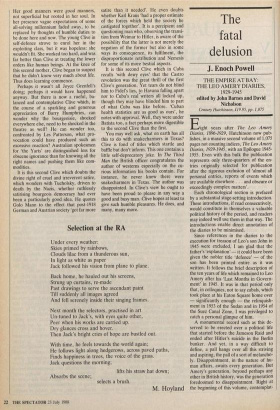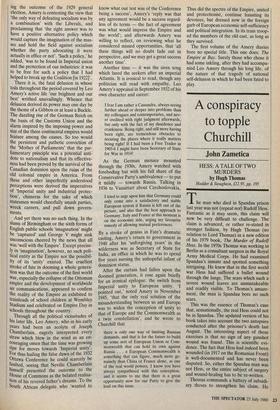The fatal delusion
J. Enoch Powell
THE EMPIRE AT BAY: THE LEO AMERY DIARIES, 1929-1945 edited by John Barnes and David Nicholson
Century Hutchinson, £19.95, pp. 1,075
Eight years after The Leo Amery Diaries, 1896-1929, Hutchinson now pub- lishes, in a massive second volume of 1,075 pages not counting indices, The Leo Amery Diaries, 1929-1945, with an Epilogue 1945- 1955. Even with this bulk the publication represents only three-quarters of the en- tries originally selected for publication after the rigorous exclusion of 'almost all personal entries, reports of events which are available elsewhere . . . and obscure or exceedingly complex matters'.
Each chronological section is prefaced by a substantial stage-setting introduction. These introductions, if read consecutively, would constitute in themselves a valuable political history of the period, and readers may indeed well use them in that way. The introductions enable direct annotation of the diaries to be minimised.
Since references in the diaries to the execution for treason of Leo's son John in 1945 were excluded, I am glad that the father's 'explanation' — it could have been given the nobler title 'defence' — of the son has been printed entire as it was written. It follows the brief description of the ten years of life which remained to Leo Amery after his 'Last Months in Govern- ment' in 1945. It was in that period only that, in colloquies, not to say cabals, which took place at his Eaton Square home over — significantly enough — the relinquish- ment in 1953 of the Sudan and in 1954 of the Suez Canal Zone, I was privileged to catch a personal glimpse of him.
A monumental record such as this de- served to be erected over a political life that started before the Jameson Raid and ended after Hitler's suicide in the Berlin bunker. And yet, in a way difficult to define, a pall hangs over all this striving and aspiring, the pall of a sort of melancho- ly. Disappointment, in the nature of hu- man affairs, awaits every generation. But Amery's generation, beyond perhaps any other in British history, was the generation foredoomed to disappointment. Right at the beginning of this volume, contemplat- ing the outcome of the 1929 general election, Amery is contesting the view that `the only way of defeating socialism was by a combination' with the Liberals, and proclaiming that 'the right answer was to have a positive alternative policy which would capture the imagination of the mas- ses and hold the field against socialism whether the party advocating it were actually in office or not'. 'Such a policy,' he added, 'was to be found in Imperial union and the protection of our industries: it was to be free for such a policy that I had helped to break up the Coalition [in 1922]'.
There it is, the fatal delusion in whose toils throughout the period covered by Leo Amery's active life 'our brightest and our best' writhed unavailingly. Whence that delusion derived its power may one day be the theme of a Gibbon or at least a Buckle. The dazzling rise of the German Reich on the basis of the Customs Union and the alarm inspired by the imposing power and size of the three continental empires would feature among the causes. So too would the persistent and pathetic conviction of the 'Mother of Parliaments' that the par- liamentary principle was a potential anti- dote to nationalism and that its effective- ness had been proved by the survival of the Canadian dominion upon the ruins of the old colonial empire in America. From these and other imperfectly understood perceptions were derived the imperatives of 'Imperial unity and industrial protec- tion', chimeras for the sake of which statesmen would cheerfully smash parties, wreck careers, and pull down govern- ments.
And yet there was no such thing. In the slums of Birmingham or the sixth forms of English public schools 'imagination' might be 'captured' and George V might sink unconscious cheered by the news that all was 'well with the Empire'. Except precise- ly in 'imagination', however, no such poli- tical entity as the Empire nor the possibil- ity of its 'unity' existed. The cruellest stroke of fate in dooming a whole genera- tion was that the outcome of the first world war, especially the collapse of the Ottoman empire and the development of worldwide air communications, appeared to confirm the reality of the Empire as exhibited to trainloads of school children at Wembley Stadium and celebrated on Empire Day in schools throughout the country. Through all the political vicissitudes of his later life, Leo Amery, who in his early years had been an acolyte of Joseph Chamberlain, eagerly interpreted every straw which blew in the wind as an en- couraging omen that the time was growing nPe for moves towards 'Imperial unity'. For thus hailing the false dawn of the 1932 Ottawa Conference he could scarcely be faulted, seeing that Neville Chamberlain himself presented the outcome to the House of Commons as the belated realisa- tion of his revered father's dreams. To the South African delegate who 'wanted to know what our test was of the Conference being a success', Amery's 'reply was that any agreement would be a success regard- less of its terms — the fact of agreement was what would impress the Empire and the world'; and afterwards Amery was willing to reflect, on reviewing what he considered missed opportunities, that 'all these things will no doubt fade out in perspective, and we may get a great success another time'.
Another time — it was the siren song which lured the seekers after an imperial Atlantis. It is ironical to read, though any politician will read with empathy, Leo Amery's appraisal in September 1932 of his own character and career:
I fear I am rather a Cassandra, always seeing further ahead or deeper into problems than my colleagues and contemporaries, and nev- er credited with right judgment afterwards, but only with the fact of my dissidence and crankiness. Being right, and still more having been right, are tremendous obstacles to securing the places where it really matters being right! If I had been a Free Trader in 1903-6 I might have been Secretary of State for War in 1914!
As the German menace mounted through the 1930s, Amery watched with foreboding but with his full share of the Conservative Party's ambivalence — to put it mildly — towards Russia. Talking in 1936 to Vansittart about Czechoslovakia,
I tried to urge upon him that Germany could only come into a satisfactory and stable European system if Russia is left out of the picture, and also that the best approach to Germany, Italy and France at this moment is on the economic side, urging my favourite remedy of allowing mutual preferences.
By a stroke of genius in Fate's dramatic casting, Amery's return to government in 1940 after his 'unforgiving years' in the wilderness was as Secretary of State for India, an office in which he was to spend five years nursing the unhopeful infant of dominion status.
After the curtain had fallen upon the doomed generation, it rose again briefly for an ironical epilogue: the switch from Imperial unity to European unity. ‘1 pointed out,' noted Amery in November 1945, 'that the only real solution of the misunderstanding between us and Europe was to widen the conception of unity to that of Europe and the Commonwealth as a twin constellation', and he wrote to Churchill that
there is only one way of limiting Russian demands, and that is for the future to build up some sort of European Union or Com- monwealth that can hold its own against Russia . . . a European Commonwealth is something that can figure, much more ge- nuinely than China or France alone, as one of the real world powers. I know you have always sympathised with this conception, and it seems to me that there is a great opportunity now for our Party to give the lead on this issue.
Thus did the spectre of the Empire, united and protectionist, continue haunting its devotees, but dressed now in the foreign garb of European economic self-sufficiency and political integration. In its train troop- ed the members of the old cast, as long as they survived.
The first volume of the Amery diaries bore no special title. This one does: The Empire at Bay. Surely those who chose it had some inkling, after they had accompa- nied Leo Amery through his long life, of the nature of that tragedy of national self-delusion in which he had been fated to play.















































 Previous page
Previous page